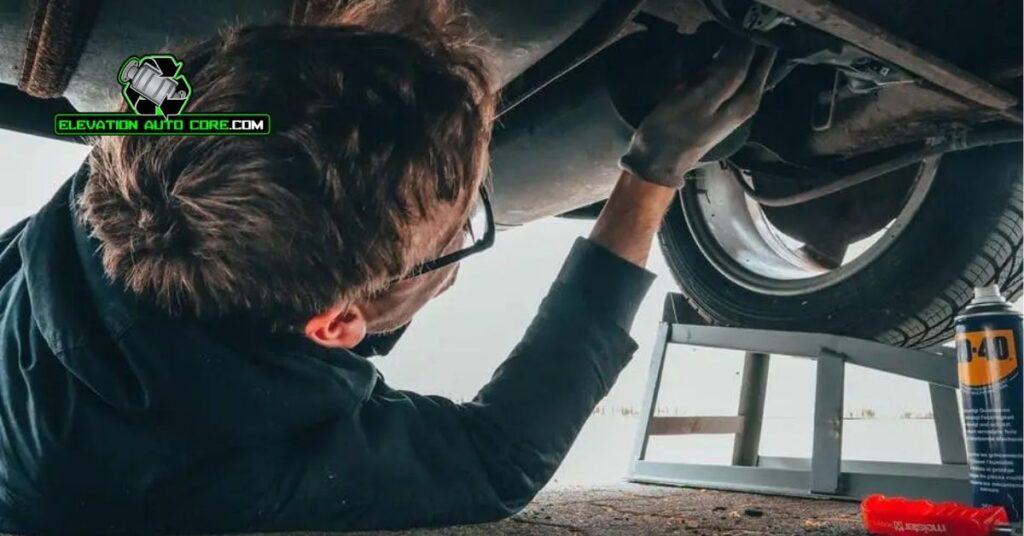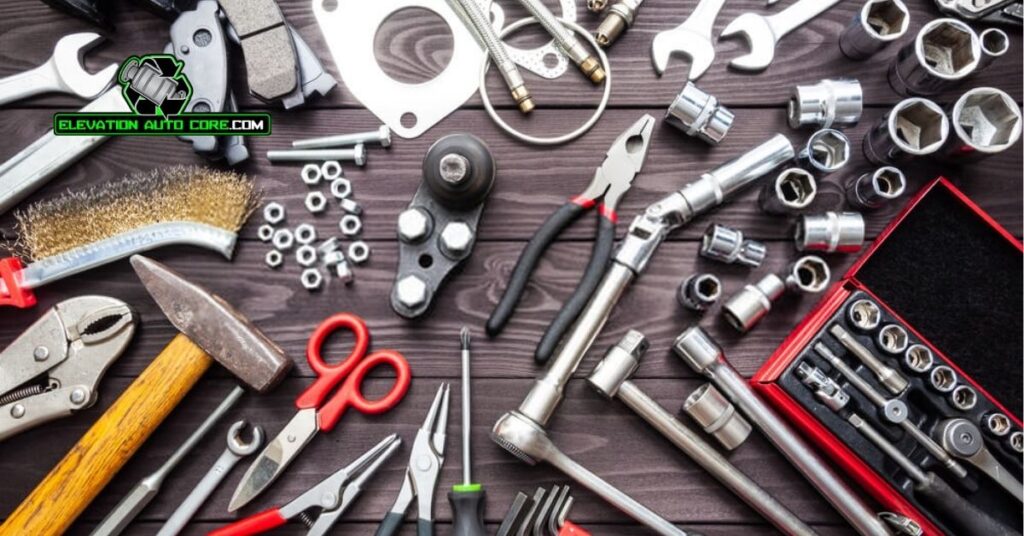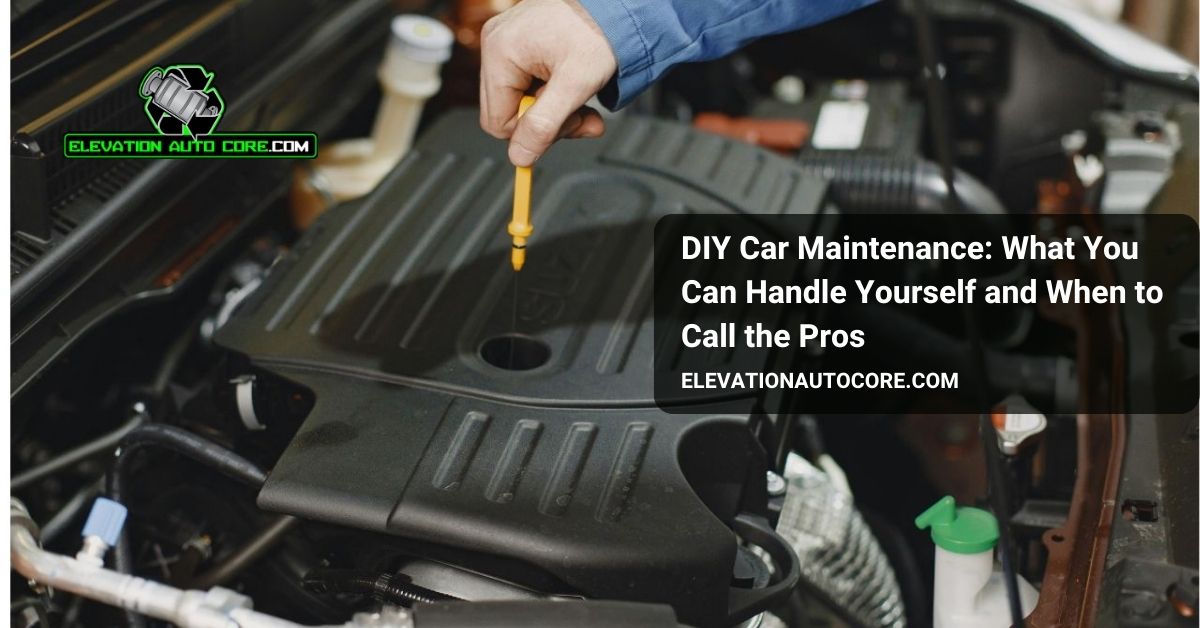DIY car maintenance can save you time and money, but do you know which tasks are safe to handle yourself? From simple oil checks to more complex repairs, understanding your limits is key to keeping your car in top shape without costly mistakes. Stick around to learn what you can confidently tackle and when it’s smarter to call in the pros.
Understanding DIY Car Maintenance

DIY car maintenance offers an opportunity to take control of basic vehicle care while saving money and reducing trips to the mechanic. Knowing what tasks you can handle ensures efficiency and safety throughout the process.
Benefits Of DIY Maintenance
Performing basic maintenance tasks yourself reduces both labor costs and the wait times associated with professional services. Simple activities like changing oil, replacing air filters, or checking fluid levels cost significantly less when done on your own. It also allows you to track your vehicle’s condition firsthand. Keeping tools and resources ready at home minimizes dependency on external appointments.
Learning these skills increases your confidence in maintaining your car’s health. Routine check-ups empower you to spot early warning signs, preventing costly repairs in the future. For example, identifying low tire treads early can avoid accidents and save on replacements. This hands-on approach contributes to a sense of satisfaction and ownership over your car.
Potential Risks Of DIY Maintenance
Overestimating your skills can lead to errors that compromise vehicle safety or performance. Forgetting to tighten bolts during a home brake pad replacement might result in accidents. Poor handling of tools or equipment risks causing personal injuries or damage to your car. For instance, incorrectly using a jack can harm both.
Certain repairs require specialized knowledge and diagnostics that aren’t easily accessible at home. Problems like engine misfires or transmission issues are better left to professionals to prevent further damage. Attempting to fix such components without sufficient expertise often results in wasted time and additional expenses to rectify mistakes.
Essential DIY Car Maintenance Tasks

Performing essential maintenance tasks on your car ensures its reliability and saves on repair costs over time. Focus on straightforward activities that don’t require specialized tools or professional knowledge.
Checking And Changing Oil
Monitor your car’s oil regularly to maintain engine performance. Use the dipstick to check oil levels when the engine is cool. If the oil appears dark or gritty, it’s time for a change. Gather a new oil filter, the correct oil type, a wrench, and a catch pan for the process. Refer to your vehicle’s manual for exact oil specifications.
Replacing Air Filters
Inspecting and swapping out air filters boosts fuel efficiency and ensures clean airflow. Locate the air filter housing, which is often secured by clamps or screws. Remove the old filter and compare it to the replacement to confirm compatibility. Replace it every 12,000 to 15,000 miles based on your driving conditions, or more frequently if you drive on dusty roads.
Inspecting And Changing Wiper Blades
Ensure proper visibility by examining your wiper blades for cracks or wear. Damaged blades leave streaks and reduce effectiveness in rain. Lift the wipers, press the release tab, and slide off the old blade. Fit the new blade securely before testing. Replace them every six to twelve months based on use and climate exposure.
Checking Tire Pressure And Tread Depth
Tires in good condition improve safety and fuel efficiency. Use a tire pressure gauge to check PSI levels, referring to your car’s manual for recommended settings. Inspect tread depth using a penny; if Lincoln’s head is visible, replace the tires. Perform these checks monthly and adjust pressure as needed.
Car Maintenance Tasks Best Left To The Professionals
Some car maintenance tasks require specialized tools, technical expertise, or advanced diagnostics. Attempting these on your own may lead to costly mistakes or safety risks. Professional mechanics are better equipped to handle the following.
Complex Engine Repairs
Engine repairs often involve dismantling and reassembling intricate parts. Replacing head gaskets, repairing timing belts, or fixing engine components demands technical knowledge. Improper handling can lead to important engine damage, resulting in higher repair costs. Professionals use advanced tools to diagnose and resolve these issues effectively.
Brake System Overhaul
Brakes are crucial for vehicle safety, and their components can be challenging to work with. Caliper replacements, rotor machining, and brake line repairs require precision. Missteps in brake maintenance may compromise your braking ability. Certified mechanics have the expertise to ensure your brake system functions as intended.
Electrical Diagnostics And Repairs
Modern cars integrate complex electrical systems with computers, wiring, and sensors. Diagnosing issues like malfunctioning dashboards, faulty alternators, or wiring shortages can be time-consuming without the proper tools. Mechanics use diagnostic software and electrical testing equipment to identify and fix these problems quickly.
Transmission Maintenance
Repairing or replacing a faulty transmission requires in-depth knowledge and specialized equipment. Tasks such as fixing torque converters, adjusting gear ratios, or replacing seals are intricate. Errors in transmission work often lead to performance failure. Professionals ensure the system operates smoothly and reliably.
Tools And Supplies For DIY Car Maintenance

Equipping yourself with the right tools and supplies is essential for successful DIY car maintenance. A well-organized set of basic equipment ensures that tasks are completed safely and effectively.
Must-Have Tools For Beginners
Start with a reliable set of wrenches, including both open-end and sockets. These are crucial for loosening nuts and bolts. Purchase a quality hydraulic jack and jack stands to safely lift and secure your vehicle. A torque wrench is necessary to tighten components to manufacturer-recommended levels without over-tightening.
Add a tire pressure gauge to monitor your tires’ inflation levels. Keep a set of screwdrivers, both flathead and Phillips, for a variety of fittings. Invest in a funnel for pouring fluids, a drain pan for capturing used oil, and durable gloves to protect your hands from grease and chemicals. A multimeter is helpful for diagnosing electrical issues. For cleanup, have shop towels or microfiber cloths on hand.
Recommended Supplies For Common Tasks
Stock engine oil that matches your vehicle’s specifications for regular oil changes. Keep replacement air filters to maintain efficient airflow and improve fuel efficiency. Include windshield washer fluid to maintain visibility and coolant fluid to ensure your engine stays at the proper temperature. Always have spare wiper blades for clear vision during rain or snow.
Buy brake cleaner for cleaning components like rotors and brake pads. Keep dielectric grease for electrical connections and anti-seize compound to prevent bolts from sticking. If your car uses a exact type of spark plug, have some of those ready for replacements. Purchase tire repair kits for temporary fixes and lubricants such as WD-40 for rusted components.
With these tools and supplies, you’ll handle many DIY maintenance tasks efficiently and confidently.
Tips For Safe And Effective DIY Car Maintenance

Safe and efficient DIY car maintenance requires preparation and an understanding of your vehicle. Focusing on the right strategies ensures successful outcomes while avoiding unnecessary risks.
Knowing Your Limits
Identify tasks that align with your experience and skill level. Simple activities like oil checks, wiper blade replacements, and air filter changes are manageable for most car owners. Avoid tackling complex repairs such as brake system work, engine diagnostics, or transmission repairs. These require specialized knowledge and tools, making it safer and more cost-effective to consult a professional. Perform basic maintenance only if you’re confident and knowledgeable about the process.
Following The Vehicle’s Manual
Rely on your vehicle’s manual as a primary guide for DIY maintenance. It includes essential information like recommended parts, fluid types, and maintenance schedules. Adhere strictly to the specifications outlined in the manual to avoid damaging components or voiding warranties. Consult this resource before starting any maintenance task, particularly for detailed procedures or unfamiliar areas.
Ensuring Proper Safety Measures
Maintain safety by wearing appropriate gear like gloves and goggles during repairs. Use tools designed for vehicles, such as a hydraulic jack with jack stands, to minimize hazards while working under the car. Keep your workspace organized and free of clutter to reduce the risk of accidents. Ensure the car is on a flat, stable surface before performing any maintenance tasks. Prevent injuries by following safety protocols consistently.
Conclusion
Taking charge of your car’s maintenance can be empowering and cost-effective when you focus on tasks within your skill set. By understanding your vehicle’s needs and knowing your limits, you can confidently handle basic upkeep while leaving complex repairs to the experts.
With the right tools, preparation, and safety measures, DIY maintenance becomes a practical way to keep your car running smoothly. Remember, balancing what you can do yourself with professional help ensures your car stays reliable and safe for the road ahead.

